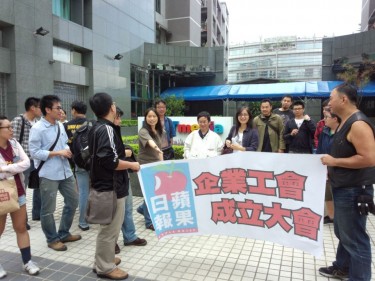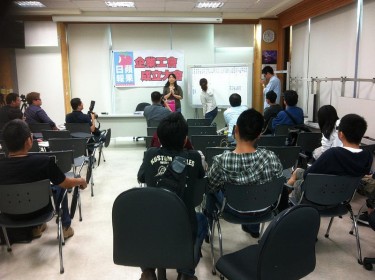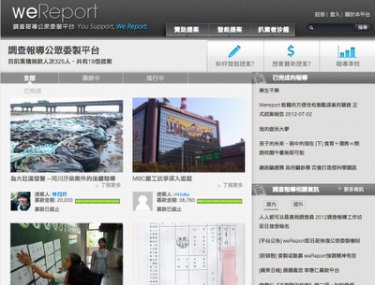In response to the erosion of journalistic autonomy as exemplified by the smear campaign of the Want Want China Times Group against a Journalism scholar and the sale plan of Next Media's print business in Taiwan, professional journalists, scholars and independent media workers start to put forward concrete plans and take action to save professional journalism.
Are journalists destined to be disposable in the media industry? How can journalists maintain their professional autonomy and be independent from their employer’s control? These are the burning questions in the Taiwanese journalist circle these days. The answer of course is “No”, but with many different solutions.

Employees from Apple Daily formed an union to assert their rights. (Photo provided by the Apple Daily Worker Union)
Agreement to ensure autonomy in journalism
Some urged media owners to sign autonomy agreements with their journalists to safeguard professional journalism against intervention. Ho Jungshin, founding president of the Association of Taiwan Journalists (ATJ) who initiated the “March for Journalism Autonomy” [zh] eighteen years ago, decided to resign from the postion of Deputy Chief Editor at Want Want China Times to protest against the media's smear campaign despite his employer Tsai Eng-Meng‘s rigorous persuasion for him to stay. He rebuked [zh] Tsai Eng-Meng:
「如何挽留」比「拚死挽留」更加重要,誠摰期盼旺中集團未來能登高一呼,率先簽定編輯部公約,帶動所有媒體簽定,以具體行動落實專業自主規範,提升新聞工作者的專業尊嚴,成為台灣新聞界的重要里程碑。
What he used to persuade me is more important than his rigorous persuasion style. [I] earnestly wish that the Want Want China Times Group will take the lead to sign the autonomy agreement so that other media will follow the example. Such a move is to ensure the integrity of journalists and will be a milestone in the development of Taiwan journalism.
Meanwhile at Apply Daily, two hundred employees, including nine deputy chief editors, swiftly formed a workers union on 29 September and elected Tsai Ryh Yun as chairperson. Tsai said [zh]:
第一個要面對的,可能就是壹傳媒經營權易主問題,工會的主要兩個訴求,即推動與資方簽定團體協約和編輯室公約,希望保障《蘋果》原有言論自由空間與勞工權益。
The first problem is probably the change of management of Next Media Group [as a result of the change of ownership]. The union will demand that the employer sign a collective contract with the union and the autonomy agreement in order to protect freedom of expression within Apple Daily and employees’ rights.

The inauguration ceremony of Apple Daily Workers’ Union. (Photo provided by Apple Daily Worker Union)
However, media scholars Liu Chang-De and Kuan Chung-Hsiang [zh] pointed out that employers may not follow the autonomy agreement. They quoted the example of Rupert Murdoch, who had undertaken to protect the professionalism and autonomy of The Times but tyrannically replaced the chief editor afterwards. When being reminded about his undertaking, Murdoch allegedly said, “Oh my God, you haven’t taken it for real, have you?”
They believe that autonomy in journalism has to be institutionalized through policy and legislation, in addition to collective awareness. The Campaign for Media Reform [zh], to which they referred, advocated that “the implementation of editorial agreement and unionization of media workers should be protected by a set of media laws”. However, Shyr Howard S.H., chairman of the National Communications Commission (NCC) which promulgated policies regarding the broadcasting media, said [zh] that “there will be no separate legislation for the autonomy agreement. Future legislation would be to enhance media's self discipline and code of conduct.”
Collective ownership and media trust
Some believe that the problem lies in media ownership and advocate media workers buying a share of media organizations or setting up media trust funds so that journalists can share decision making power.
Liu Chang-De suggested [zh] the employees of Apple Daily should follow examples from overseas and find way to take control of the company by buying a share and encourage some private-funds to help them to take control of the company ownership. Such a strategy would turn the media company into a social utility which is publicly owned, regulated and shared.
Huang Jhe-Bin, the former deputy chief editor of www.chinatimes.com and the former reporter-in-chief of China Times’ investigative office, also urged Tsai Eng-Meng to hand over China Times to a trust fund. He suggested [zh] to Tsai:
讓《中國時報》如同英國的《衛報》或《經濟學人》,交付信託,某種程度上捐給社會公眾,也證實他不打算干預媒體人事及內容。
對台灣社會而言,因而得到一份真正獨立的媒體;對蔡先生而言,他能擺脫他原本沒興趣的報紙產業,也不會如此頻繁挨罵,若能如此,旺旺集團及他的社會形象,絕對會大大加分。至少,我會永遠敬佩這位豪氣阿莎力的商人,我會每天早晚在心底對他三鞠躬致敬。
Follow the examples of The Guardian or The Economist in the United Kingdom: hand over China Times to a trust fund. Such a move would represent, to some extent, a giveaway to the general public and would also show that [Tsai] had no intention to intervene with the personnel or the substance of the media.
This can bring to Taiwan genuinely independent media and allow Tsai to steer away from the newspaper industry that has never interested him and from the persistent condemnation and blame. If this ever came true, the public images of both the Want Want Group and Tsai himself would be considerably lifted. Then I would admire this valiant businessman and pay my heartfelt tribute to him three times every day and every night.
However, neither Want Want China Times nor Next Media gave an affirmative response to the suggestions.
Independent report for public interest
Many have strived to explore new paths to professional journalism outside the territories of conventional media organization.
Hu Yuan-Hui, former chief executive of Public Television Service, and Lo Shih-Hung, associate professor of National Chung Cheng University, together with some others, founded weReport [zh], a project which promotes investigative journalism through public endorsement and support. Under the slogan “You support, We report”, former journalists and independent journalists are encouraged to submit news reporting proposals, to cover the news with the support of public donations. In return their reports will be contributed back to the public domain and be free to be published by all media outlets. It is hoped that with this, professional journalists are able to practice investigative journalism and bring impact and changes. The inaugural declaration [zh] of weReport stated:
新聞業並非企業財團型媒體的專利,唯有公民參與新聞產製的行列,並以具體行動支持優質的新聞業,新聞才能成為我們公共生活的良伴。
Journalism should not be monopolized by media enterprises. It is only when the public participate in news production and take substantive action to support quality journalism that news shall enrich our public life.

(Screen capture of weReport.)
Zhu Shu-Juan, Feng Xiao-Fei and some other independent journalists founded Independent Media Academy [zh] with the vision to unite independent media workers. Through intensive classes and a mentorship program, they seek to train more professional journalists. As stated in their Academy's manifesto:
二○一二年,台灣媒體正經歷一場重大的變革。許多獨立媒體記者從傳統媒體出走,以專業、深入的報導,在台灣媒體混沌的年代走出另外一種可能,對於促進公共議題討論、形塑公民意識、推進政治民主,都發揮了關鍵的影響力⋯⋯
台灣媒體價值正在打破、重建中,未來也充滿了無限的想像與可能,在這個歷史的轉折點,希望結合更多專業的獨立媒體人,共同形塑台灣媒體的新價值。
Media in Taiwan is undergoing a significant reform. A large number of independent journalists have left conventional media enterprise and walked on a new path for professional journalistic practice in a turbulent age for Taiwan media. This has forged crucial impacts on public agenda setting, citizenship practice and development of democracy…
The values of Taiwan media are going through the phases of destruction and reconstruction. The future is full of possibilities. It is hoped that at this turning point in history, more independent professional media workers will be united to strive for the one and same goal – to shape the new values of Taiwan media.







2 comments